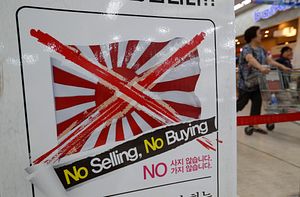This week the Japanese government is expected to make the decision to exclude South Korea from its “white list” of trusted export countries, who have preferential treatment through simplified export procedures. If the move is implemented, by the end of August Japanese firms selling semiconductor materials to South Korea will be required to obtain approval for each export contract — a process that could take 90 days.
The Japanese government cited national security concerns to justify its plans to tighten its export controls on semiconductor materials shipped to South Korea. However, South Korea argues Japan’s latest trade tactics are a politically motivated attempt to signal displeasure over an October 2018 Supreme Court ruling in South Korea ordering Japanese companies to compensate former wartime laborers.
In response, angry South Korean trade unions have taken countermeasures into their own hands, amplifying calls over social media to boycott major Japanese brands. Anti-Japanese sentiment has been growing since the boycott first started on July 5. Last week Korean delivery workers refused to handle shipments of Japanese fashion retailer Uniqlo while workers at petrol stations refused to service Japanese-branded cars. A public survey conducted on Thursday by Japanese broadcaster TBS revealed that 62.8 percent of the 504 respondents were participating in the boycott.
In a surge of patriotism, some 23,000 retailers decided to withdraw Japanese beer, condiments, cosmetics, and pens from their shelves while posting notices letting customers know they will no longer be selling or buying items made in Japan. According to South Korean media, the sale of Japanese beer has fallen 15.6 percent at major Korean supermarket chain E-Mart compared to last year’s figures. Meanwhile, sales of Korean beer have risen by 19 percent along with imported beer by 17 percent.
Japan’s tourism outlook is also feeling the heat. South Korea sends in the second highest number of foreign tourists to Japan after China. Travel agencies preparing holiday packages tailored to South Korean patrons are being forced to discontinue tours altogether with the fall in demand. Asiana Airlines, which operates daily service between Seoul and Chitose airport in Hokkaido, is considering cancelling the route due to a 30 percent fall in reservations in August compared to last year. Hotels within the Jozankei onsen district in Sapporo, Hokkaido, which is typically popular among Korean tourists, reported a string of cancellations. The Jozankei Tourism Association expressed concern over the spread of the boycott, reporting a fall in lodging reservations in October — a popular season when autumn leaves are most vibrant.
At the political level, Japan and South Korea clashed at the WTO headquarters in Geneva over the legality of Japan removing South Korea from the “white list” of trusted export countries. Despite Seoul calling the export restrictions “unfair” and a violation of WTO code, its appeals to the highest level of WTO authority, the General Assembly, were ignored. The international community is reluctant to get involved in the heated exchange, declaring the matter a bilateral dispute rather than a multilateral trade issue.
On Wednesday the Korean government submitted an official statement to Japan asking not to exclude South Korea from the white list in an effort to persuade the cabinet before deliberation begins this week. South Korea stressed they are “ready to talk anytime, anywhere” but criticized Japan’s lack of willingness to engage in dialogue.
The semiconductor materials needed to manufacture display screens on cell phones and tablets are Japan’s top export to South Korea. The measures taken by the Japanese government have raised questions about the long- and short-term economic losses Japanese companies will face. Critics have pointed out that trade restrictions to South Korea could not only disrupt the global supply of semiconductors but will also slow down company sales to major Korean customers and could lead to the development of substitutes where Japanese firms could lose their international competitiveness.
































